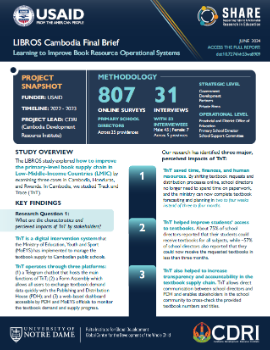
SHARE LIBROS (Learning to Improve Book Resource Operational Systems) Cambodia, Final Brief
This policy brief presents key findings from the technical report "Learning to Improve Book Resource Operational Systems (LIBROS) in Cambodia". The study examined the perceived impacts, development, and implementing factors of the Track and Trace (TnT) system, a digital intervention implemented by the Ministry of Education, Youth, and Sport (MoEYS)...
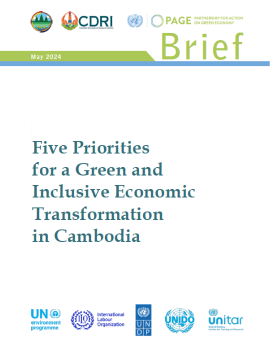
Five Priorities for a Green and Inclusive Economic Transformation in Cambodia
During the First PAGE National Steering Committee in Cambodia, PAGE also presented a summary brief outlining five priorities that serves as a roadmap for policymakers and stakeholders to identify the obstacles and opportunities for fostering a green economic transition in Cambodia: Unlocking private and public finance More evidence on different...
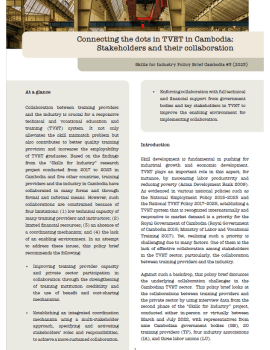
Connecting the Dots in TVET in Cambodia: Stakeholders and their Collaboration
Collaboration between training providers and the industry is crucial for a responsive technical and vocational education and training (TVET) system. It not only alleviates the skill mismatch problem but also contributes to better quality training provision and increases the employability of TVET graduates. Based on the findings from the “Skills for...
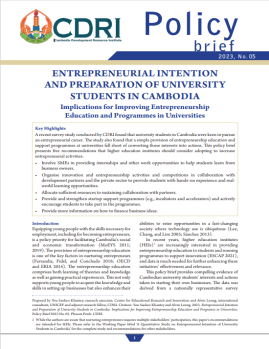
Entrepreneurial Intention and Preparation of University Students in Cambodia: Implications for Improving Entrepreneurship Education and Programmes in...
A recent survey study conducted by CDRI found that university students in Cambodia were keen to pursue an entrepreneurial career. The study also found that a simple provision of entrepreneurship education and support programmes at universities fell short of converting those interests into actions. This policy brief presents five recommendations th...
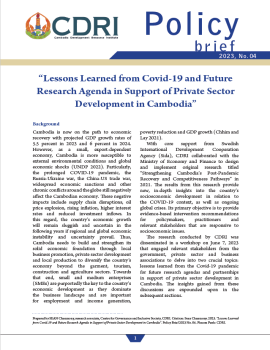
Lesson Learned from Covid-19 and Future Research Agenda in Support of Private Sector Development in Cambodia
Cambodia is now on the path to economic recovery with projected GDP growth rates of 5.5 percent in 2023 and 6 percent in 2024. However, as a small, export-dependent economy, Cambodia is more susceptible to external environmental conditions and global economic shocks (UNDP 2022). Particularly, the prolonged COVID-19 pandemic, the Russia-Ukraine war,...
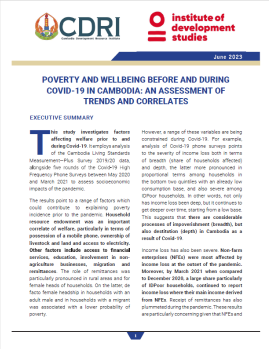
Poverty and Wellbeing Before and During Covid-19 in Cambodia: An Assessment of Trends and Correlates
This study investigates factors affecting welfare prior to and during Covid-19. It employs analysis of the Cambodia Living Standards Measurement—Plus Survey 2019/20 data, Frequency Phone Surveys between May 2020 and March 2021 to assess socioeconomic impacts of the pandemic. The results point to a range of factors which could contribute to expla...
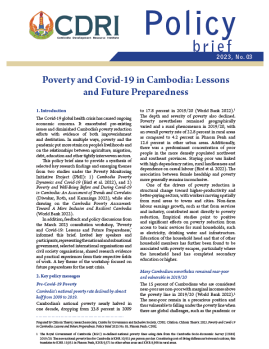
Poverty and Covid-19 in Cambodia: Lessons and Future Preparedness
The Covid-19 global health crisis has caused ongoing economic concerns. It exacerbated pre-existing issues and diminished Cambodia’s poverty reduction efforts with evidence of both impoverishment and destitution. In multiple ways, poverty and the pandemic put more strain on people’s livelihoods and on the relationships between agriculture, migratio...
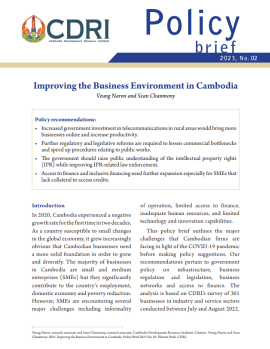
Improving the Business Environment in Cambodia
In 2020, Cambodia experienced a negative growth rate for the first time in two decades. As a country susceptible to small changes in the global economy, it grew increasingly obvious that Cambodian businesses need a more solid foundation to grow and diversify. Most businesses in Cambodia are small and medium enterprises (SMEs) but they significantly...
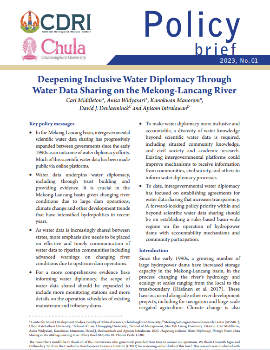
Deepening Inclusive Water Diplomacy Through Water Data Sharing on the Mekong-Lancang River
In the Mekong-Lancang basin, intergovernmental scientific water data sharing has progressively expanded between governments since the early 1990s as an outcome of water diplomacy efforts. Much of this scientific water data has been made public via online platforms.Water data underpins water diplomacy, including through trust building an...
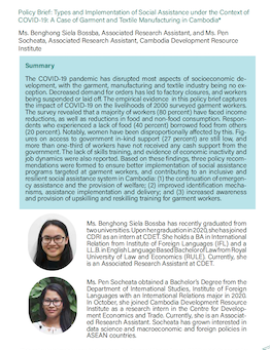
Types and Implementation of Social Assistance under the Context of COVID-19: A Case of Garment and Textile Manufacturing in Cambodia
The COVID-19 pandemic has disrupted most aspects of socioeconomic development, with the garment, manufacturing and textile industry being no exception. Decreased demand for orders has led to factory closures, and workers being suspended or laid off. The empirical evidence in this policy brief captures the impact of COVID-19 on the livelihoods of 20...
